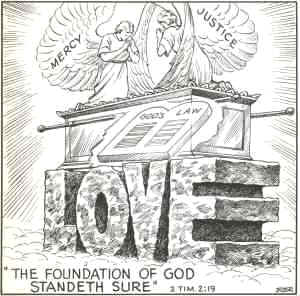MORAL LAW
Definition of law
Law may be defined as a rule of action. The dictionary has this definition:
- law n
- binding or enforceable rule
- piece of legislation
- legal system
- Law is just what this definition says, binding or enforceable rule, which is rule of action, a piece of legislation, and a legal system. In a generic way law may be applied to every type of action, whether it is of matter or of the mind, and whether it be free action or necessary action.
Difference between physical and moral law
Physical law is any natural occurrence that causes ordered movement or sequence within matter or mind and does not consist of actions of the free will. Thus, it is called a law of necessity since it involves changes or actions that are involuntary. This includes involuntary states of the mind. Any mental state or action which cannot be controlled by the will would be called physical law. These are things that are controlled by our physical body or mind over which we exercise no control. They occur naturally. The law of gravity is a physical law. We hear, smell, taste, feel, and touch as part of the physical law. We have reflexes that are part of the physical law. When something approaches our eye, for instance, the eye lid closes as a part of physical law. It has been wrongly assumed in some Christian circles that developing reflexes or doing “right by reflex” is part of moral law. They are wrong! Reflexes do not have sanctions or penalties and they cannot be moral since there would be no virtue in an action being done by reflex. So when someone talks of right by reflex, it cannot be right since it would by definition require a choice and a reflex, strictly speaking, is action without the choice of the will. So, right by reflex is something that does not exist in the moral law.
Moral law is a rule of action that has sanctions or penalties. Moral law is what a moral agent ought to do and the value of the action is enforced by the value of the sanction or penalty that accompanies it. Moral law involves the government of free and intelligent action unlike physical law which is not free and is unintelligent. Moral law is something that one has a liberty to choose, not a law which makes it impossible to choose. Moral law also indirectly controls involuntary states of the mind where free choices can control mental states which lead to involuntary actions through physical law. An example of moral law controlling involuntary states of the mind is that of a person feasting their eyes on something which is immoral and thus causing an involuntary action of the body which causes feelings and desires which are part of physical law but have been caused by the voluntary action of gazing upon immoral objects or situations.


